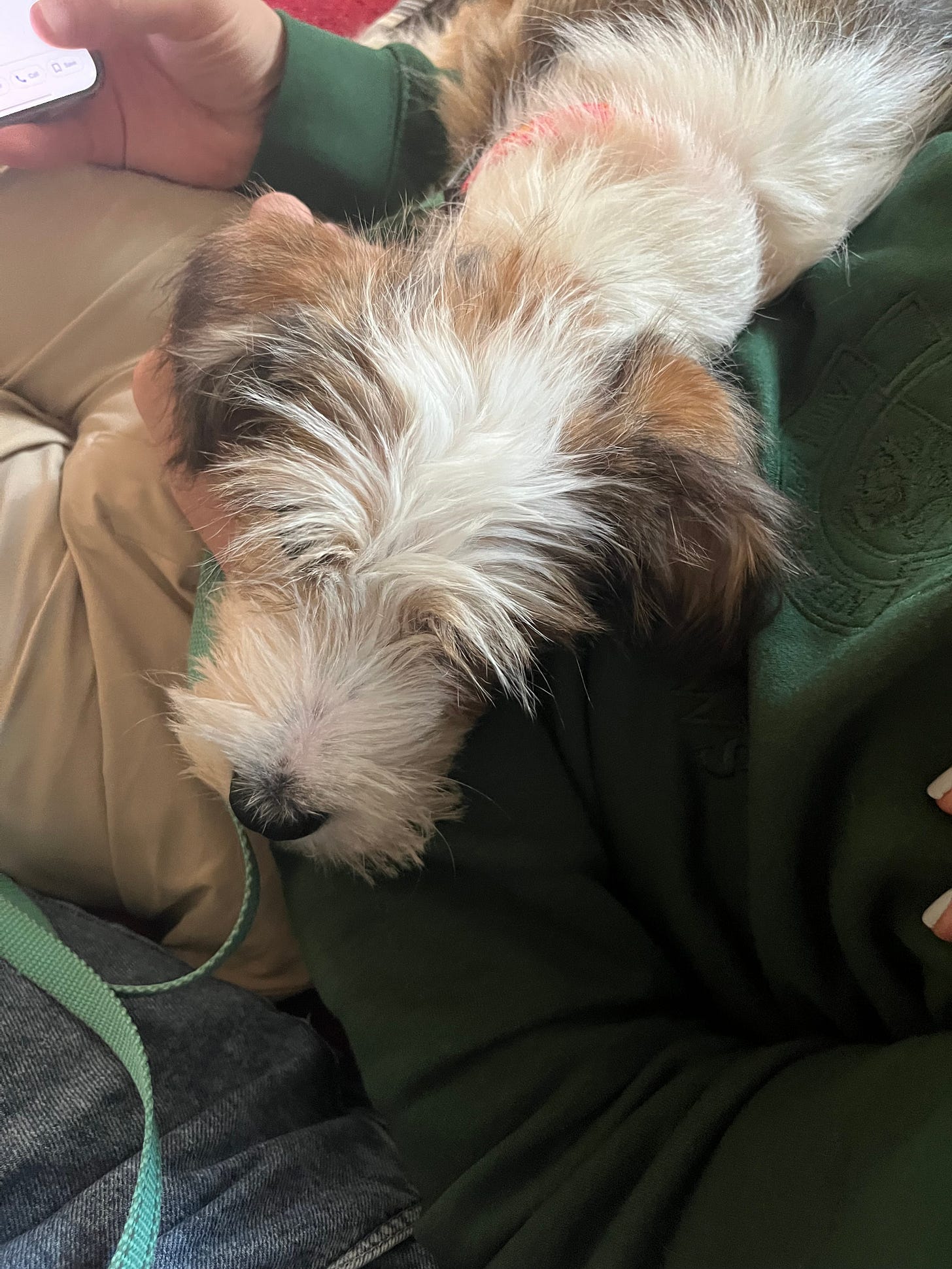About a month ago, I decided to quit listening to podcasts cold turkey. Feeling a little stuck in a rut, I was re-reading The Artist’s Way, where Julia Cameron argues that, to create good art, we must be attentive to the world around us:
Our focused attention is critical to filling the well. We need to encounter our life experiences, not ignore them. Many of us read compulsively to screen our awareness. On a crowded (interesting) train, we train our attention on a newspaper, losing the sights and sounds around us—all images for the well.
Yikes. If simply reading on a train was so damaging to someone’s connection with the external world, what was my podcast addiction doing to me, day in and day out, constantly consuming other people’s words?
I’d tried different things in the past to try to limit my podcast consumption—giving them up for Lent but still listening to them on Sundays, trying to give myself a time-of-day or number-of-podcasts limit. The embarrassing stats on my Spotify Wrapped indicated that this did not work this year, just as it did not work last year or the year before.
The only tool left to me was my ability to be irrationally stubborn about something—a talent I like to tell myself that I only pull out every once in a while at appropriate times. So I just decided, that day, that I wouldn’t listen to podcasts until Christmas.
And I hate it. I thought it would get easier, but especially in the morning, when I used to tune into a breezy news podcast as I got ready for the day, I want nothing more than to turn one on and hear the cheerful jingle that signals the burst of dopamine in my brain.
It’s commonplace to argue, nowadays, that podcasts can become a stand-in for human connection. During the “epidemic of loneliness,” people are seeking a feeling of being surrounded by friends and family—and podcasts can fill that gap. We can tune in on-demand to familiar voices, get to know personalities that begin to feel familiar, be a fly on the wall to interesting conversations.
I think that is the quality of podcasts that appeals to me the most. Friendship as an adult is an odd thing, and though it’s lovely to pursue new friendships through coffee and occasional outings to the farmer’s market—and I do—or catch up with old friends over the phone or on FaceTime or during 36 hours in your old hometown—and I do—there’s one experience of friendship that is difficult to construct, or reconstruct, quickly, and it’s one of the feelings that I love most of all—listening to a conversation without having to participate.
Don’t get me wrong—I love to insert my own opinion into conversations. But there’s a certain kind of subtle delight in hearing a debate raging about the right time to listen to Christmas music or a deep conversation about a piece of literature without having to facilitate the conversation yourself. This past weekend, we were out visiting family in my old hometown, South Bend, and hearing people argue about theology in the next room over was nearly as heartwarming as the deep conversation I was having with girl friends in the kitchen.
Being an extrovert in social situations can be strangely lonely. I often find myself leveraging all of my skills to keep a conversation going with a stranger, especially when it’s something I haven’t done for a while. It’s easy to think that extroverts love this kind of thing, but I think even the most extreme among us find it exhausting at times.
That’s the feeling I find myself missing—craving, even. The feeling of falling asleep with the help of a glass of Pinot Grigio on the end of the couch while your friends discuss the election or someone’s ex-boyfriend. The brief moment when you realize you’re in between two conversations at the dinner table, and both are interesting, and you hesitate deciding which one to join. Riding in the back of the car while two old friends exchange insults in the front seat.
Listening to podcasts doesn’t just simulate having friends—it simulates having old friends. I think that’s why many people find them so addictive. Friends are hard to find—old friends are, by definition, impossible to find. They have to grow.
Like most cat people, I don’t mind dogs. And like most human beings, I find puppies absolutely irresistible. Nonetheless, I encouraged my now-husband to get our current puppy before we got married, because I’m aware from experience that the puppy stage can be a lot. Now almost two, our puppy is adorable, and exhausting, and completely full of love.
People love to make fun of millennials for getting puppies instead of children, and in a way I can see their point. It’s obviously a problem if you are putting off having kids for no good reason and you get a dog instead, especially if you treat that dog like a person. But I think dogs are a better substitute for human connection than podcasts are.
If I’m being completely honest, the hardest thing about making friends as an adult has been accepting the fact that making friends really takes work. Listening to podcasts does not take work. Except for the occasional frightening blank when none of your favorite podcasters has dropped a new episode, listening to a podcast is one of the easiest possible things you can do. I never simply sit and listen to a podcast—I always do something else, because it is not all-consuming.
Having a puppy, on the other hand, takes a lot of work. As a non-dog person I’ve quipped that I’m willing to wake up in the middle of the night to clean up puke for a baby human, but not for a baby dog. I’m not going to be tempted into any more foolhardy comparisons between having a puppy and having a baby, but I have a feeling that this reluctance is not a very good thing. It’s the same reluctance that causes me to turn to podcasts over and over again rather than going out on a limb and going to the church social.
A puppy reminds you that while you can be given free, unlimited love, that love will make demands upon you—demands like cleaning up poop, and puke, and going out in the early morning in the cold, and losing sleep because she ate yet another piece of weird plastic. A puppy will insist on being with you even when you are in a bad mood. She will ignore the fact that you are not in the mood to snuggle because you are watching a movie, or falling asleep, or on a work call. She will always, always, always want to play, no matter how exhausted both of you are.
And because of all these demands, I think the millennials are on to something—a puppy really can teach you something about love. Podcasts can teach you things—they can teach you a lot of facts, certainly, and if you get lucky you might find one that can pass on some wisdom. But I don’t think they teach you love. So if you’re going to fill your days with something meant to stave off loneliness, my vote is to turn off the podcast and get a dog.
Come back in two weeks: for a patron-only post on why an oil refinery is like the movie musical Wicked.
Speaking of which: check out my review.
From The Lamp: the habit I’m thinking should probably replace my podcast habit.






